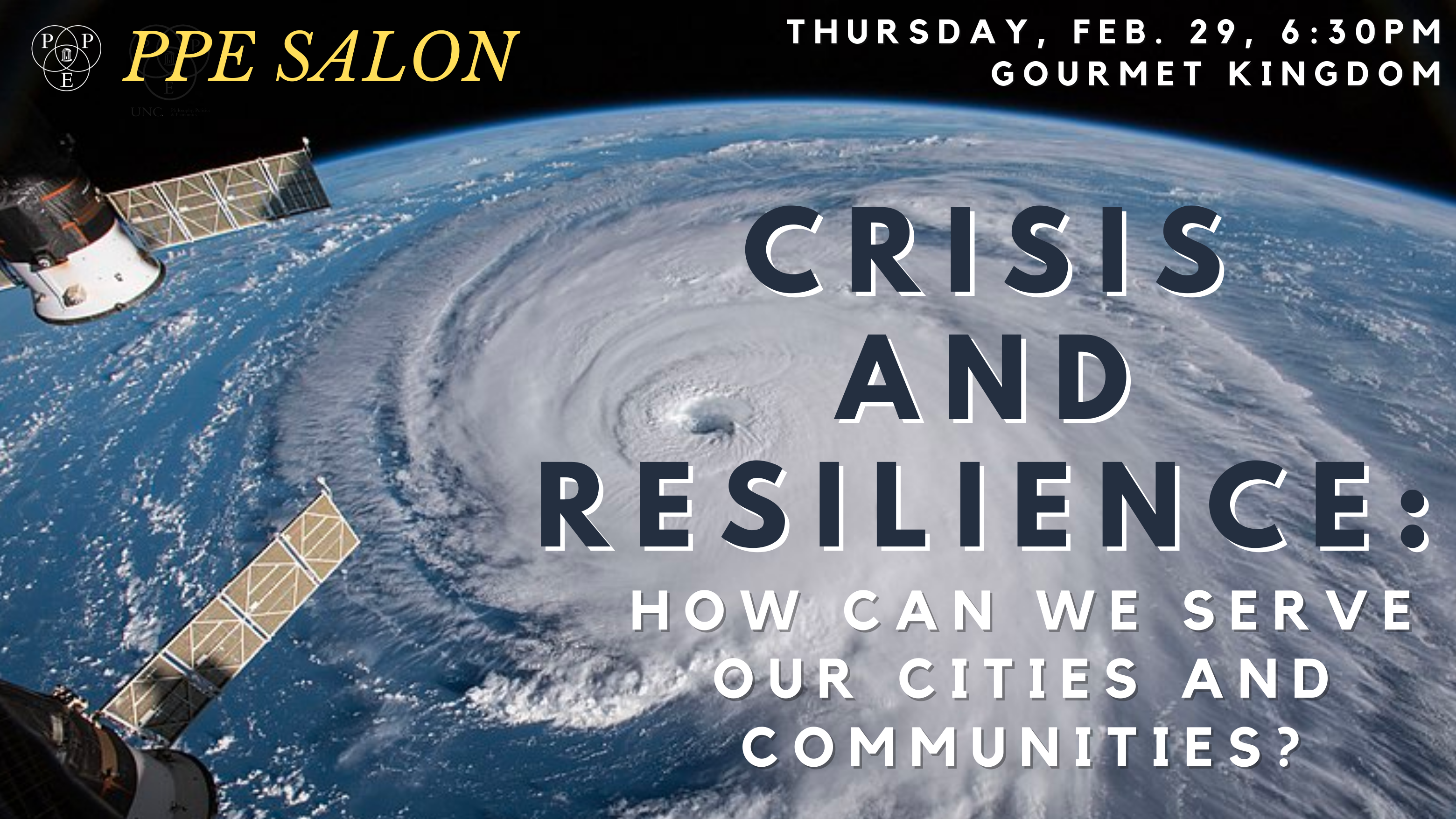
- This event has passed.
PPE Salon: Crisis and Resilience: How Can We Serve Our Cities and Communities?
February 29 @ 6:30 pm - 8:00 pm

Use the form HERE to request a seat at this salon. Please note that the readings must be completed in advance of attending the event.
Discussion Leader: Maitland Thull, Office of Resilience (Alabama)
Salon Description: The field of Urban and Climate Resilience is growing quickly, with cities across the country seeking strategies to best face the challenges of the 21st century.
Urban and Climate Resilience is the capacity of systems, communities, and individuals to adapt, bounce back, and thrive in the face of adversity. Acute shocks (e.g. natural disasters, pandemics) and chronic stressors (e.g. homelessness, litter, racial disparities, climate change) lessen the resilience of cities over time, and vulnerable communities are often most affected. In an increasingly fraught and interconnected world marked by rapid urbanization, climate change, and economic and social disruptions, resilience offers a holistic framework for addressing complex challenges head-on.
Resilience methods go beyond traditional risk management by emphasizing proactive approaches to building hardiness and sustainability for the long-term. Resilience is less about merely managing well in the aftermath of expected crises, but is more about proactively strengthening cities in advance, such that they can flexibly respond well when the inevitable-but-unknown crises do arrive. This proactive approach looks like mitigating the long-term, chronic stressors and requires building strong local networks of community stakeholders who can work well together. The four major resilience planning sectors for most cities are infrastructure, environment, economy, and community.
This transformational methodology shift in city governance works to reduce vulnerability and to improve well-being in the now, while future-proofing communities and critical infrastructure for the long-term.
Bring your questions about PPE & Local Governance, City Planning, and Urban Development. For students interested in career opportunities involving Local Politics, Sustainability, Climate Change, or Community Development, bring questions about opportunities to look for and skills to build as the field of Resilience expands.
Discussion Leader Bio: Maitland Thull is one of only two appointees to the first Office of Resilience in the State of Alabama. As one of the first Resilience Coordinators on the Gulf Coast and in the Deep South, she works at the cutting edge of an emerging field. She uses tools for inclusive community engagement, strategic stakeholder collaboration, federal grant writing, and project management to fortify the City of Mobile against “acute shocks,” like hurricanes and pandemics, and “chronic stressors,” like homelessness and sea level rise. She holds a Bachelor of Science in Professional Studies from the University of Alabama in Huntsville, with concentrations in technical writing, computer science, GIS, and communication.
Required Readings:
- City of Mobile’s 2023 Resilience Assessment, especially Sections 3 & 4. The City of Mobile’s Resilience Assessment offers an example of a comprehensive analysis of a city’s capacity to withstand and recover from various shocks and stresses, ranging from natural disasters to economic fluctuations. By identifying interconnected challenges such as infrastructure aging, socioeconomic disparities, and climate change impacts, the assessment offers actionable insights to empower stakeholders in fostering a more adaptive and inclusive urban environment, for the sake of the city’s continued prosperity and well-being in the face of economic, environmental, and social uncertainty.
- Resilient Cities Network- What is Urban Resilience? The entire Resilient Cites Network website is worth exploring to learn more, but this page offers a quick primer on Urban Resilience.
- “Mayors and the Climate Crisis.” The 2022 Menino Survey unpacks mayors’ current views on local climate action and related issues and argues that the future of Urban & Climate Resilience depends on local leaders and the capability of those who advise them. The report shows how the study of PPE intersects with the field of Urban & Climate Resilience. Many of the most basic understandings of Resilience are highly contested and politicized, especially in the American South. Conducting a Resilience Assessment and implementing a Resilience Plan in such an environment can be a feat of politics and compromise. Local climate action can be costly and complicated, and it must compete with all the other challenges mayors are facing. With the passing of the 2022 Inflation Reduction Act, a wealth of federal dollars became available to American cities to address climate change, which helped the issue gain higher priority in local government.


